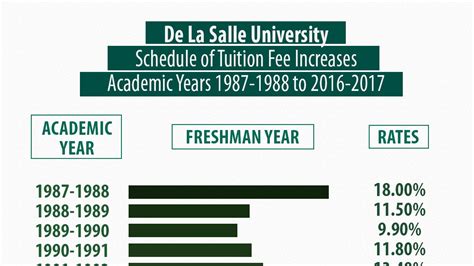Introduction

De La Salle University (DLSU) is a prestigious private research university in the Philippines. As with any educational institution, the cost of tuition is a primary concern for prospective students and their families. This guide aims to provide a detailed overview of De La Salle’s tuition fees, payment options, and financial aid opportunities to help you make informed decisions about your educational journey.
Tuition Fee Breakdown
The tuition fee for De La Salle University varies depending on the program of study and level of education. Here is a breakdown of the tuition fees for the academic year 2023-2024:
| Program | Tuition Fee (PHP) |
|---|---|
| Undergraduate | 180,000 – 250,000 |
| Graduate | 200,000 – 350,000 |
| Professional Studies | 250,000 – 400,000 |
Additional Fees
In addition to the tuition fee, students are required to pay additional fees, including:
- Enrollment Fee: 5,000 PHP
- Medical and Dental Fee: 2,000 PHP
- Activity Fee: 1,500 PHP
- Technology Fee: 1,000 PHP
- Laboratory Fee (for applicable courses): Varies
Payment Options
De La Salle University offers flexible payment options to accommodate students’ financial needs. These options include:
- Full Payment: Pay the entire tuition fee in one installment.
- Semesterly Payments: Pay the tuition fee in two equal installments.
- Monthly Installments: Pay the tuition fee in 10 monthly installments.
- Bank Financing: DLSU has partnered with various banks to offer student loans and tuition financing programs.
Financial Aid Opportunities
DLSU is committed to providing financial assistance to deserving students. The university offers various scholarships, grants, and loans to help students cover the cost of their education. Some of the available financial aid opportunities include:
- Academic Scholarships: Based on academic merit and financial need.
- Athletic Scholarships: Offered to student-athletes who meet certain eligibility criteria.
- Cultural Scholarships: Awarded to students who demonstrate exceptional talent in the arts or culture.
- Need-Based Grants: Provided to students from low-income families who are unable to afford the full cost of tuition.
- Student Loans: Loans provided by external financial institutions to help students cover the cost of tuition and other expenses.
Common Mistakes to Avoid
- Assuming you won’t qualify for financial aid: Don’t hesitate to apply for financial aid, even if you think you may not qualify. Many students receive some form of assistance, regardless of their financial background.
- Waiting until the last minute to pay your tuition: Payment deadlines are strictly enforced. Avoid late fees and potential penalties by making your payments on time.
- Not exploring all your payment options: Consider all the available payment options and choose the one that best fits your financial situation.
- Not budgeting for additional expenses: Remember that tuition is only one component of the cost of education. Factor in other expenses such as housing, food, transportation, and books when planning your budget.
FAQs
- What is the deadline for paying my tuition? The deadline for paying your tuition varies depending on the payment option you choose. Check with the university’s finance department for specific deadlines.
- Can I get a tuition refund if I withdraw from a course? Yes, you may be eligible for a tuition refund if you withdraw from a course before the deadline. The refund amount will depend on the number of weeks completed in the course.
- How do I apply for financial aid? You can apply for financial aid by filling out the university’s online application form. The deadline for submitting your application varies depending on the type of aid you are seeking.
- Who should I contact if I have any questions about my tuition? Contact the university’s finance department or the office of the registrar. They will be able to provide you with up-to-date information and assistance with any tuition-related matters.
Conclusion
De La Salle University offers a wide range of educational opportunities, but it is important to carefully consider the cost of tuition and other expenses. By exploring the various payment options and financial aid opportunities, you can make informed decisions about how to finance your education and achieve your academic goals. Remember to avoid common mistakes, consult with university officials when needed, and approach your financial planning with a thoughtful and proactive mindset.
